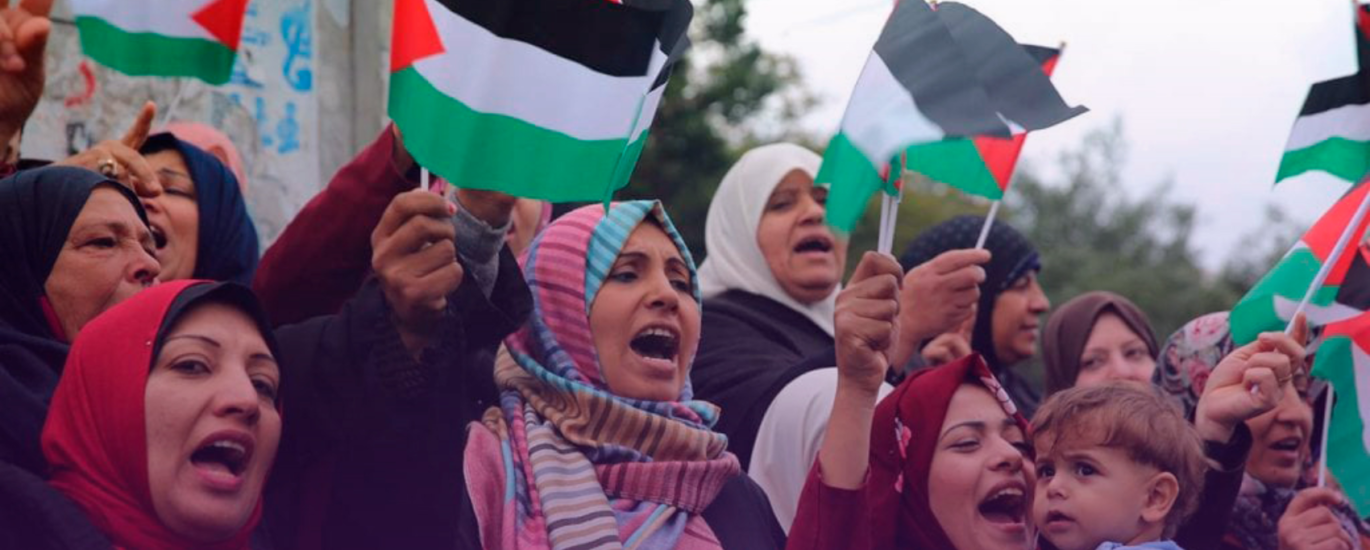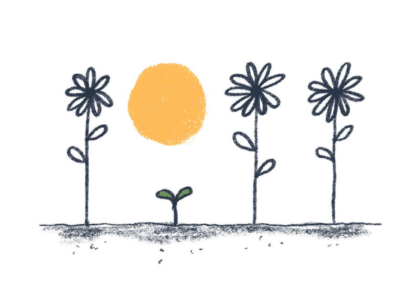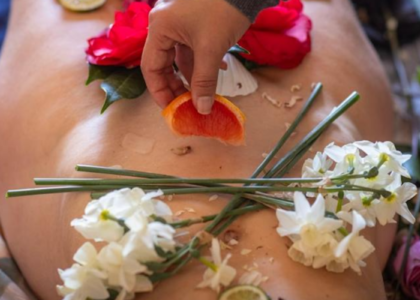“women are affected in different ways and in horrifying ways”
Amy is joined by Dr. Randa Tawil to discuss the history of Palestine, how the ongoing atrocities in Gaza are a feminist issue, and the most effective ways for everyday people to take action for peace.
Our Guest
Dr. Randa Tawil

Dr. Randa Tawil is an assistant professor of Women and Gender Studies at Texas Christian University. She received her doctorate in the Department of American Studies at Yale University and she specializes in Migration and Mobility, Ethnic Studies, and Arab Middle Eastern Studies. Her manuscript, Race in Transit: Mobilities Between Greater Syria and North America, examines knowledge production around the “good” and “bad” migrant from Syria through the lens of mobility. She has articles published in academic journals, The Washington Post, and Open Democracy, and is a member of the Palestinian Feminist Collective.
The Discussion
Amy Allebest: In the news outlet Al Jazeera in January, 2024, Maryam Aldossari wrote an article titled ‘For feminists, silence on Gaza is no longer an option’. She wrote: “Every day I come across opinion pieces and social media posts by feminists rightly condemning Hamas’s egregious actions toward Israeli women during their October 7th attack and their treatment of female hostages in its aftermath. These arguments and statements are unquestionably valid and undoubtedly necessary. Such grave crimes against women and girls, against anyone, should never be ignored, excused, or forgotten. And yet, these very individuals, these self-proclaimed feminists, are eerily silent about Israel’s similarly egregious actions against Palestinian women.” In the months since January, I’ve seen many essays and articles declaring that what is happening in Palestine is a feminist issue, and I’m so grateful to be able to explore this topic today with Dr. Randa Tawil. Welcome, Randa.
Dr. Randa Tawil: Hi, thank you so much for having me.
AA: I’m really excited to have this conversation with you today. It’s so important. We’ll start by having me introduce you with your professional bio, and then afterwards I’ll ask you to introduce yourself a little bit more personally. Randa Tawil is an assistant professor of Women & Gender Studies at Texas Christian University. She received her doctorate in the department of American Studies at Yale University and she specializes in migration and mobility, ethnic studies, and Arab Middle Eastern-American Studies. She’s interested in how race and gender are made meaningful for migrants during transit and how sites outside of the United States contribute to racial and gender formation within the country. Her manuscript, Race in Transit: Mobilities between Greater Syria and North America, examines knowledge production around the “good” and “bad” migrant from Syria through the lens of mobility.
Connecting archives in Lebanon, France, Mexico, and the United States, she recreates the routes of French shipping companies, US immigrant inspectors, Syrian migrants, and European missionaries to show how race, gender, and sexuality were made meaningful categories not just in the home or destination country, but in the routes in between. She’s an experienced teacher who has taught both introductory and upper level courses in gender studies, ethnic studies, and critical refugee studies. She has articles published in academic journals, The Washington Post, and Open Democracy. And Randa also is a member of the Palestinian Feminist Collective, which is where we met each other, Randa, I had contacted the Palestinian Feminist Collective, and then we were in contact with each other. I’m so grateful to have you today. I wonder if you can start us off by telling us where you grew up, where you come from, what your positionality is, and your point of view, and what has brought you to do the work that you do today.

RT: Yeah, thank you. And again, thank you for having this really important conversation on your show. I grew up in Washington, D.C. My father is Palestinian and my mom is Lebanese. My father left Palestine and moved to Beirut when he was young, so I’ve been to Beirut many times. I’ve only been to Palestine once, but both places are, of course, a huge part of my identity. In terms of coming to this work, my first week of high school was September 11th, 2001. So, in a certain sense, my adolescence was really shaped by a lot of anti-Arab racism, a lot of war rhetoric on the Arab world. And so, for me, as a curious individual, as somebody trying to kind of reckon with what I knew through my own family history, through going to Lebanon, through talking to Palestinians and Lebanese people, and what the news was telling me and what my classmates thought, I really needed to, and I think you find this with many Arab-American scholars or Arab scholars, reckon with this dissonance. To understand the history of this anti-Arab knowledge in the US, and situate and understand what Palestine means, what Lebanon means, to the US power system.
So I went to college and I had wonderful feminist mentors who encouraged me to study more about Arab-American history, about Middle Eastern history. And I went to pursue my doctorate in a kind of transnational Middle Eastern studies focusing on the US and US empire. That’s kind of where I situate myself in this. I’m a scholar, but I also have this lived experience. And much of my scholarship comes from trying to answer questions that either the answers have been distorted by our media or our knowledge in this country, imperial desires in the country, or they’ve just been hidden.
AA: Thanks for sharing that. I’m really eager to hear what you have to say about these topics that we’re going to bring up in our conversation. As we dive right in, I feel like any time a conversation has come up in my life about Palestine and Israel, I feel like I don’t even want to have the conversation unless the person understands the historical context going back actually quite a while. Because it’s critical to have a common vocabulary, a common understanding of what the issues actually are, so I’d love it if you could give us a bit of that historical context on the history of Palestine, the formation of the state of Israel, so when people are hearing in the news about things happening in Gaza, they can have it on a map and have a bit of a chronological timeline in which to situate these events.
RT: Well, I’m a historian, so I feel you very much in going back to the root of things. The way I think of it is really thinking of a history of Zionism, and situating this history starting in Europe. And starting with four intersecting political movements and ideas that are happening in Europe: empire, nationalism, antisemitism, and Zionism. All of those things are kind of working together in a confluence to get us to where we are today, actually. A couple of things to think about. One is imperialism. In Europe, the late 19th century and the early 20th century was a moment of extreme competition in terms of land grabs across the world. There’s this famous scramble for Africa that happened in the 1880s, that’s about Europe securing lands in Africa. Of course, British colonization of India and parts of Asia, all over the world. And so Europe has these colonial interests and this region that we know as Palestine, or Greater Syria, is part of the Ottoman Empire that Europe hasn’t been totally able to encroach on yet. There’s the building of the Suez Canal, which connects Europe to Asia, and so there is this penetration, but they haven’t been able to penetrate the Ottoman Empire. There’s this kind of imperial history happening in the background.
At the same time, we have anti-Semitism in Europe. Antisemitism increased particularly in Eastern Europe. So you see a lot of Eastern European Jews being victims of pogroms, being victims of racist laws, and many are moving to Western Europe in the same time period and moving to the United States. We think of the 1880s, 1890s, early 20th century as this time of mass migration. A lot of Jewish people from Eastern Europe are moving, so we have this happening. And all of these things are related.
And then we have nationalism. In Western Europe and in the US and across the world, the idea of what is a nation-state, what makes a country cohesive, this idea is that it’s an ethnic homogeny. You have to have a group that is ethnically homogenous to make a nation-state. And also, it’s intertwined with these ideas of white supremacy. So you need a certain “race stock” of people, right? Because if you’re going to have a country that’s a democracy, you care about who the people are who live in your country, because they vote and they’re citizens instead of subjects. And because we are in this moment of white supremacy, it matters to these countries who is coming in. So we’re seeing, again, this migration of Jewish people from Eastern Europe into Western Europe that has antisemitism but is also becoming more nationalistic. And this is where the roots of Zionism start.
In Zionism, these ideas of kind of a national home, right, an ethnic homogenous home for Jews becomes a relatively popular idea because it ties to nationalism. These overarching ideas in Europe about nationalism, about having a state that’s homogenous, it also is a reaction and ties justifiably to the kind of extreme violence that Jews were experiencing particularly in Eastern Europe, but all over Europe. And then it also ties in this moment with imperial interests, because having this national home for European Jews in Palestine creates a space that is lucrative for the British and the French to have a stronghold there. And we see the founders of Zionism, like Herzl, one of the biggest founders, he is actually aligned with the British. He is telling the British that actually having a national home for Jewish people in Palestine will be helpful for the British for their imperial gains. He’s very explicit about that. He cozies up to Balfour, who, in the same year that he creates the Balfour Declaration, promising a Jewish homeland, he writes an exclusionary law for Jews not to migrate to England. So you have this kind of confluence of these different movements, but aligning in these very particular ways to make Zionism both popular for Jewish populations in Europe, but also for imperial interests.
empire, nationalism, antisemitism, and Zionism. All of those things are kind of working together in a confluence to get us to where we are today
This is where Palestine comes in. Palestine is a place in the Fertile Crescent, it has an indigenous population, and it was controlled by the Ottoman Empire after World War I. France and Britain partitioned what was Greater Syria and basically created mandates there. So the Palestinian people have never had self-sovereignty or self-representation. In this place, in Palestine as well as other areas in Greater Syria, you have anti-colonial movements. For example, in 1939 there was the Palestinian general strike, where the whole population actually had a general strike against the British mandates. What we see is that the British mandate is kind of aligning with the new settlers in Palestine because they are more connected to these imperial interests. And this culminates in the War of 1948, or the Nakba, where Jewish settlers have their kind of militias and there is violence between Arab Palestinian populations and Jewish settlers. In 1948, the Jewish settlers enacted a large scale of violence against the population, displacing over 700,000 Palestinians. They make massacres in Deir Yassin and other villages, and of course the rumors of these massacres make people move as well. And people left their homes with an idea that they would go back to them after the war. A lot of people move around during war or are displaced, but for Palestinians after the creation of Israel, for many of them they’ve never been able to return back. And that’s what people talk about with the right of return.
For the people in Gaza, most of the population in Gaza is not from Gaza. They were a part of that original 1948 displacement, the Nakba, and live in Gaza. So Gaza has always been a site of Palestinian resistance, and so many resistance movements happened in Gaza. I would say the biggest next roadblock is the war of 1967, in which Arab countries tried to invade Israel but they failed. And Israel set up an occupation in both the West Bank and Gaza, meaning a military occupation, so they don’t have sovereignty. This became harsher during a total siege of Gaza in the 2000s, where what’s allowed into Gaza and what’s allowed out of Gaza is totally determined by the IOF. You have Gazans not having access to their sea, not having access to their air, not having access to their land, not having mobility. The UN described it as the largest open-air prison in the world. Out of this context, we get this attack on October 7th. I think that hopefully gives a history of what has brought Zionism into Palestine, how this has been a very explicit, settler-colonial, national project. It’s a project for an ethno-national country, right? For a Jewish state. That is also a settler project on land that has an indigenous population and is funded and aligned with imperial European and American interests. As we move closer in history, America also becomes intertwined in these interests.


AA: Well, again, thank you for that enrichment of the narrative. We’ll keep going along on the timeline, but also bringing in some of the themes that I think are really, really important in understanding what’s happening. And one of them is the connection between the Zionist settler project and the ideology of patriarchy. How are those two things connected?
RT: Thanks for that. I think we can say settler ideology in general, because we see a lot of these connections. A settler mission is to extract land and replace the original inhabitants with new inhabitants. So, part of the project of a settler-colonial state is about annihilating the natives and replacing them, and that replacement is fundamentally reproductive. It is tied to heterosexuality. It is tied to very particular gender roles of producing a nation. And so, in the settler-colonial context, sexuality, enforced heterosexuality, and gender roles become really important because it’s all about reproducing. And we see that in the case of settler colonialism, but there’s both the reproduction of the new population, the settler population, and the annihilation of the original inhabitants. That often happens through gendered violence towards women, because, as I said, these projects are fundamentally about reproduction. And what is the site of an indigenous reproduction? It’s the woman, right? It’s the childbearing person.
So that person is often the target of settler-colonial violence, whether that’s by not allowing life to thrive, by taking away what allows life to thrive, or whether it’s directly violence against women, in particular. And, you know, I recently read a really good book by Elyse Semerdjian called Remnants, and it’s about the Armenian Genocide. She does a feminist analysis of the Armenian Genocide, and it’s a very powerful book. She argues that with genocide, with annihilation of a people, part of that is gendered violence, because often violence against women and children breaks up a population. It actually destroys the family, it destroys the constructions of a family home and who is protected and who isn’t. And so in that sense, violence against women, and I would say violence against reproduction, is kind of essential for this project.
AA: Yeah. Well, it’s really, really distressing. And rape and sexual crimes have been used as a weapon of war all over the world, sadly, and I think probably have been.
RT: Because it’s effective in destroying communities. We all live in patriarchal societies in general. So when the patriarch of a family can’t protect their children and the woman in the family, this breaks up the family unit, which is kind of the building block of a larger people.
AA: When we were speaking before you talked about the link between land theft and genocide, like you referred to, as the woman’s body as a conquered territory.

RT: Exactly. We’re seeing that in really grotesque ways with images coming out of Gaza, particularly with IOF soldiers posing with women’s underwear, right? Making fun of and humiliating Palestinian women’s sexuality. And so there is this direct link between taking of the territory and a kind of sexual conquest of a people. Because ultimately, you, if you are the settler, are taking the land to replace the people. And in order to do that you are the ultimate heterosexual citizen. And as the ultimate heterosexual citizen, part of that, of course, is othering someone else, making someone else seem deviant. So we see this sexual humiliation of Palestinian women showing that they wear lingerie, so they’re deviant women. They are making fun of these women, painting them as somehow sexually deviant while performing a robust heterosexuality.
And we see news reports that for a lot of these soldiers, their dating profiles are now pictures of them in Gaza. It’s a part of the sexual scene now because they’re so linked. Because ultimately, land is life. Our relation to land, indigenous people’s relation to land, is about the reproduction and the balance of life. So when you’re taking land you are taking away a type of life that links people and allows people to sustain themselves. Reproduction is the way that people sustain themselves on the land that sustains them. And so when you are breaking that apart, you are breaking reproduction on a territorial level, like living off the land, but also on the human level of reproduction and population. Those are connected.
AA: Well, Randa, if you could update us on what’s going on in Gaza right now, we’re recording this in the first week of May in 2024. Tell us what’s going on in Gaza and why, as we talked about at the top of the episode, why we should see these events as a feminist issue.
RT: Right now we’re really in a horrific part of this seven-month onslaught. It’s hard to imagine how things get worse because we’ve had so many horrific images, unimaginable images, unspeakable images that we’re seeing, and testimonies. Israel just took over the border between Egypt and Rafah so that no humanitarian aid can come in. They’ve shut down the Al Jazeera offices so that reporters can’t report what is happening, and they’re telling people in Gaza, in Rafah, “Go to East Rafah, go to Khan Yunis,” go to this place or that place, which I would argue is a death march. I think that they are sending people on death marches. It is hot and people don’t have access to water. People don’t have access to food. This is the largest population of children with amputated limbs that now have to somehow move when they don’t have access to any kind of hospital. I think that what we’re seeing really is the absolute destruction and genocide of the Palestinian people in Gaza. And I think that’s always been the plan.
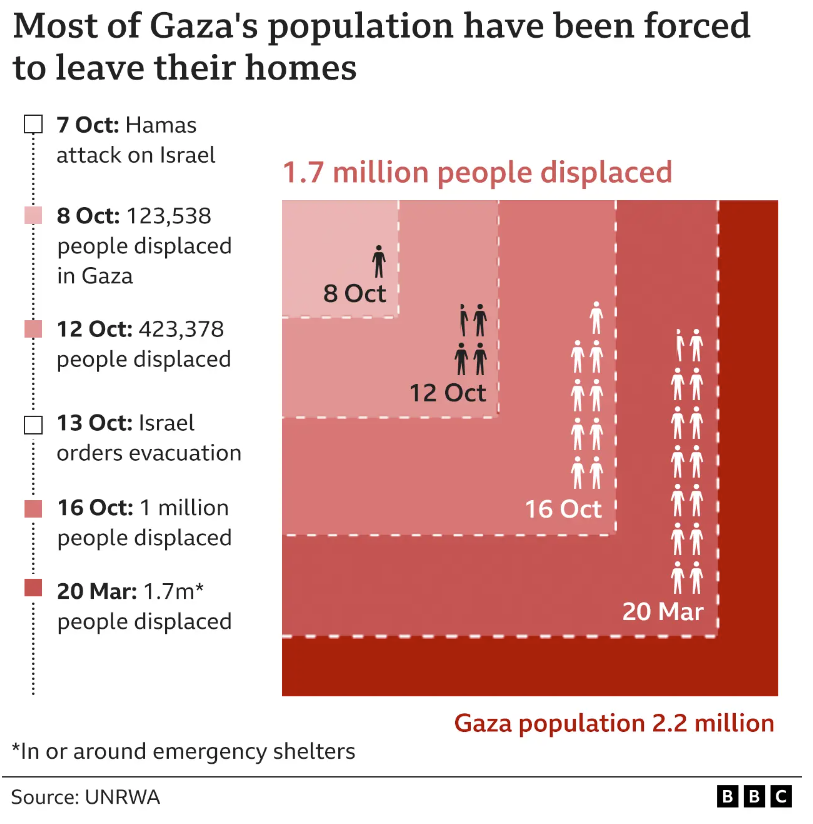
AA: It’s just horrifying.
RT: And we know that women bear the brunt in these kinds of civilian massacres because they are often the ones who are taking care of children, they’re often the ones who are getting food. This isn’t to dismiss Palestinian men, who’ve been doing some of the most brave and important work, digging people out of rubble with their bare hands when they probably haven’t eaten for days. But we also know that women are affected in different ways and in horrifying ways. We know that women don’t have access to any products for their periods. I think 50,000 women are pregnant right now in Gaza with no hygienic place to give birth. We’re also seeing that the children they do give birth to are dying because women are starving and can’t give breast milk. These children are being born prematurely and small due to the stress. I mean, I can’t think of an image or a story that is more genocidal than a woman who is starving and can’t give breast milk to her baby so the baby dies. That literally is the killing of a people through horrific means. And we see this affecting women in very particular ways that are feminist. This is reproductive genocide.
AA: Yes. And I think this is what people are referring to when they say this is a feminist issue. If we say we care about women, then we care about all women and we have to look at what’s happening to these women.
RT: Absolutely. And we have to look at the gendered violence of war and the gendered violence of these kinds of imperial projects. It’s not enough to think about feminism in terms of rights, because if people don’t have political rights on a global scale, if they don’t have self-sovereignty, then how are we even going to speak about rights? It’s actually about challenging what your notion of feminism is, what your notions of freedom are, because what are political civil rights or equal pay or raises or dressing how you want, what does that mean to somebody who doesn’t have any sovereignty or any self-determination?
AA: This reminds me of another topic that I wanted to ask you about, this concept of intersecting oppressions and how, for some people, what we would think of as a huge problem is definitely not their biggest problem. I’ll just pose this to you. I was walking past a poster on my campus the other day, and it was a poster about the genocide in Gaza. And then on top of that, someone had pasted this note that said something to the effect of that Palestinian men oppress Palestinian women and queer folks or the LGBTQ community. So the implication was that women and queer folks should not support Palestinian liberation because they’re sexist and they’re homophobic. How do you respond to that, Randa?
challenging what your notion of feminism is, what your notions of freedom are
RT: Honestly, I think that’s so grotesque, distorting reality, and actually quite violent. First and foremost, solidarity is not transactional. Solidarity is based on the idea that my liberation is tied to your liberation, that we all need to be free. It’s not about how different people feel about people, right? It is not a transactional act, it’s a community building act. So that’s first and foremost. But I also think it completely obfuscates the ties of political rights and gender justice, and it obfuscates the real issues of the violence that’s happening to women. I get this, I give these talks and I will always get people in the audience who say this. And to me, it’s like, okay, you’re doing this for some sort of feminist or liberal kind of progressive talking point. What you’re literally doing is silencing a Palestinian woman who’s giving a testimony. So whatever kind of ideas you have about being progressive and caring about marginalized people, you’re quite literally, when you do that, you’re silencing Palestinian women, Arab women, queer folk in Palestine, and telling them what you think their problems are.
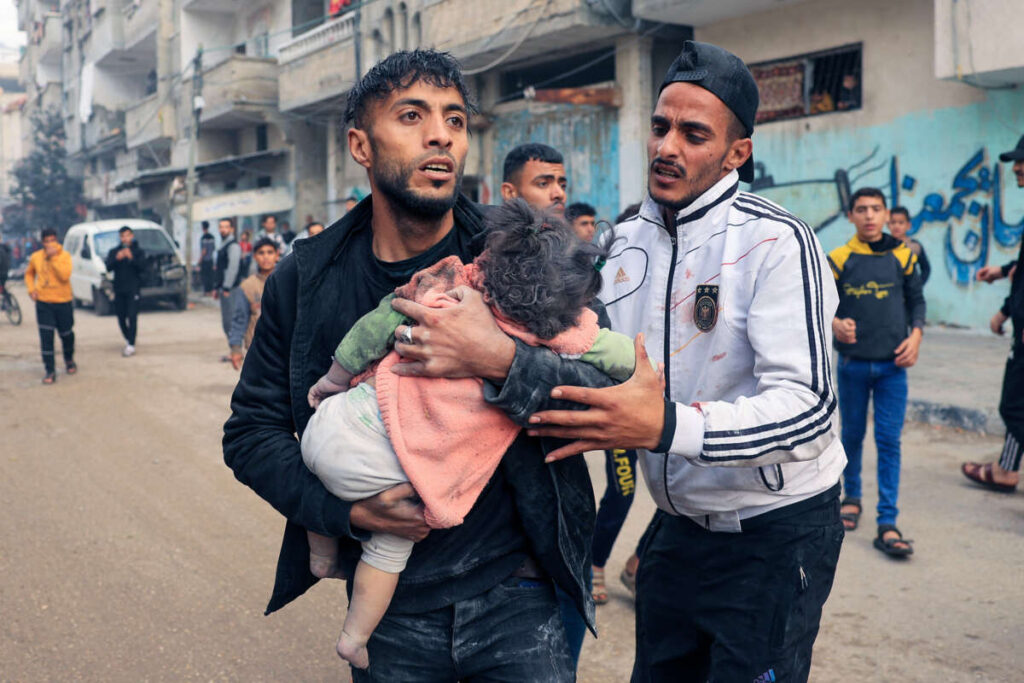
I listened to your episode with Elora Shehabuddin, and she really goes into this history of Western feminism as creating this idea of the Eastern woman in contrast to the Western woman, but also this idea of knowing them better than they know themselves. And this is also a pillar of Orientalism by Edward Said, this idea that the West knows the East or the Orient, however you want to call it, better than they know themselves. And this is obviously built on a kind of white supremacist idea. I also think that it doubly silences Palestinian women and queer folk because if the way that you silence an idea of liberation is by villainizing men, then as a Palestinian woman, as an Arab woman, as an Arab queer person, if you have a critique of men in your population, you don’t want to give it because it’s fodder for distortion and manipulation by American or Western media to then feed into this discourse. And so it kind of silences people twice. There’s this famous saying that colonial wars are white men saving brown women from brown men. And implicit in all of this is the vilification of brown men, and we can focus on Palestine, the vilification of Palestinian men. That’s what’s implicit. And when we’re in a country that’s actively going to war with them, this serves the war machine. It serves the war narrative because we have to save these women from these men. How do we do that? We go to the country and we kill the men or we take over from the men.
AA: Yeah. And like you said, I’ve seen so many images and videos of Palestinian men digging through rubble, and they’re the ones tenderly holding children and carrying people to safety. And so it strikes me also, just as I think of my own experience in my own life, how intimately connected and all knotted up my experience with patriarchy has been. When I think about how I’ve experienced patriarchy, it’s just so complicated because sometimes the people who are kind of enacting patriarchy in my life are people I know, they’re men in my community that might drive me crazy, and the system might be really unjust, but there are also people who are kind to me and there are men who love me. And I just think of the audacity of someone else if they were to come into my context and be like, “You need to do this differently in your relationship with your father.” I’d be like, “Get the hell out, how in the world would you know?” I can see anytime I try it on for me, it’s just completely inappropriate for a different group of people to come in and tell other people how they should interact with their own.
RT: I also get questions all the time when I’m talking, people will just come back at me with, “Well, Hamas raped these women, Hamas raped these women,” as if war and violence against women is a competition. As if that makes it okay that Palestinian women are living in a nightmare right now.
AA: Well, thanks, Randa. As long as we’re talking about really controversial topics that are in the air right now, and this conversation about the woke and the anti-woke and what are the valid ways of critiquing the things that are going on, let’s talk about the protests on college campuses. You are a professor on a college campus, and I know you’re following this really closely. What do you think of what’s happening?
RT: I think the bravery of the students is incredible. I think about their generation, and I’ve read a lot of their own testimonies on social media and whatnot. And if we think about their lives, they have lived through constant fear of school shootings where nothing happened, they’ve lived through the election of Trump, they’ve lived through COVID, all of these things while they have not been able to vote. They’ve had no rights during this period. So all of these things that have been unprecedented, literally every day the headlines are like, “This is an unprecedented hit on our democracy.” Climate change, every year it’s getting hotter and they have not been able to use their political voice because they’ve been under 18. I think it’s horrific the way the college administration has acted towards them. Horrific. Allowing police on campus for peaceful protests is not only horrific in a violence sense, but also in the idea of freedom of speech and freedom of thought. These students are enacting their rights for freedom of speech, freedom of thought, and freedom to gather.

And so for me, I think this is really the US showing its face that it would rather beat up its own children than stop killing children in Palestine. That’s really what’s happening. And I think that they are hitting on the nerves of the war machine of corporate interests. We’ve seen over the last forty years that universities have become more and more profit driven, that endowments are the thing that universities care about, and their endowments are tied to weapons manufacturers. We have seen the university basically betray young people by having their money go to things that these young people aren’t interested in, as opposed to financial aid, as opposed to making college affordable. And so, yes, I’m very proud of them. I hope they continue. I hope people join. I’ve been to one of these encampments. They’re beautiful places. People are kind to each other, they have community rules, they are having teach-ins, they have delicious food, they’re creating a space that has been taken from them.
AA: I love it.
RT: I feel strongly.
AA: Yes, I can tell! I think that’s really, really great to hear that opinion on it. That leads me to another question I had, which is, how effective are these protests? And the bigger question is, how can people who do really care about Palestine help? My personal experience with this, once this started happening I wrote to President Biden and I wrote to my state representatives. And beyond that, I honestly don’t really know what to do. And I see so many “Free Palestine” comments on Instagram and sometimes it doesn’t even matter what the topic is. You’ll just see the people in the comment section that are like, “How can you even talk about this issue when this is happening in Gaza?” or simply “Free Palestine.” I don’t know what those comments actually do, and sometimes it can feel almost performative to me. And you see people now jumping on the bandwagon who maybe don’t even know the history but it’s kind of like the cool thing to do, to be honest. I’m not saying it’s bad, I’m just wondering if it’s effective. And I don’t even know who to donate to now. Once the World Food Kitchen was bombed, I don’t even know if any donations will reach the people that I want to reach to help. What would you say is an effective way to make a difference?
RT: Well, I think there are many ways. The most effective, which honestly has been the biggest threat, is the Boycott, Divestment, Sanctions campaign. That has actually hit Israel in a way that other nonviolent peaceful protests have not been able to. That’s why we see different states in the US passing laws that people can’t be part of BDS. Why would a government pass a law that you can’t boycott a private business except if it’s a very effective strategy? So, look up the company and boycott. That is very effective. Social media is effective too, particularly because people from Palestine are asking us to post. I think that it is important to heed the call of people on the ground. I think that there is a lot of shadow banning happening on social media, there is a lot of censorship that’s happening. So the more you boost, the more you write “Free Palestine”, the more these posts will be shared. I think also just disruption, disruption. That can be just writing “Free Palestine” so no one can forget what is happening now. No one can pretend that this is a normal time. Disruption can mean a protest, disruption can mean writing “Free Palestine” on your Instagram.
Disruption can mean stopping ships that are going to Israel with weapons. I think the most effective thing, frankly, is wasting the government’s money. Because if I look at history and I see when empires give up their colonies, or when powers stop supporting colonialism in a space, it’s not because anyone has a moral change in leadership, it’s because it becomes too expensive to justify. The population starts to get angry that so much money is going, and that’s what we see now, we see people are like, “Wait, why are we sending millions, billions to Israel when we don’t have free healthcare, when our schools are failing,” X, Y, Z. So, part of protest is wasting government funds. Stopping a ship for 10 minutes, that wastes a huge amount of money. Protesting, that takes all the police, all their time, all their overtime, all that money. Flooding your senator’s office with calls. Then the aides have to be on the phone all the time as opposed to doing their actual job. That wastes money. And so I would actually say that’s the most effective.
AA: Hm. I do wonder, so you would say that social media, just posting about it in the comments would have an effect? Are you saying that because that’s one grassroots way to spread the word because then that leads to a citizenry that is going to perhaps vote differently or that then they’ll get involved in boycotts of Israeli products? So you’re saying it is effective to have, just, when I see fights in the comment section that’s so polarized and spending so much time just kind of yelling at each other in the comments, I’m like, what is this even doing? Is it helping anybody in Palestine? I don’t know.
RT: I think you shouldn’t feed the trolls, you shouldn’t get in fights online, that’s kind of pointless in my opinion. But I do think posting and spreading information, because there has been basically a media blackout on so much of this. I’m sure most of the listeners and you have seen, for example, the brutal police attacks on college students, but we’ve seen that mostly on social media. At least I have. I’ve heard testimonies from college students on social media, not in the news. Mitt Romney and Antony Blinken literally had a conversation a few days ago about banning TikTok because it’s bad PR for Israel. Social media has been incredibly effective because for the first time in 75 years, Palestinians are actually being able to talk directly to the US population in a way that they have never been able to. And I also just think that in general with social movements, you never really know what is going to work. You never really know, but it’s about constant pressure. And it’s also about keeping that social movement alive, because in our news cycle it’s very easy for something to get big and then people forget about it.
I think the most effective thing, frankly, is wasting the government’s money
You know, I’ve been working on Palestine, I’ve been advocating and protesting since I was in diapers, you know, and I could never imagine what’s happening right now. But there are years where nothing happens and then there’s a year where everything happens and you just don’t know. You have to just keep going. And I would also finally say about social media that I do think right now the government is gaslighting us so much about what’s happening. I think for a lot of people, me included, it’s a bit of a refuge to be able to talk to people and see people who also feel as horrified as I do. Because you walk around and you’re just like, “Has anyone been affected by this?” The things we are witnessing, you know, it’s crazy-making. If you’re a Palestinian, if you’re an Arab, I guarantee you this is the only thing that you talk about with your family. This is the only thing that you think about from basically morning to evening. It is everything and it is crazy-making when you go into a coffee shop or into a shopping mall, and it’s like, “Does anyone realize what’s happening?” And you just want to scream. So, honestly, my phone has become a place where I can do that without getting arrested. Yet.
AA: Haha, oh boy. Yeah. Well, thank you. Thank you for sharing that perspective, Randa. That’s actually really helpful for me to see that it is helping and that it has a real value. And like you said, for all of its ugliness in the comments section, and sometimes the arguing, I do think this isn’t helping, but the upside is that, and thank you for reminding me of this, it is a more democratic space where people can say what they’re going to say, and you don’t have the arbitration of the big, powerful media companies that are deciding what the official story is.
RT: But I never read the comments.
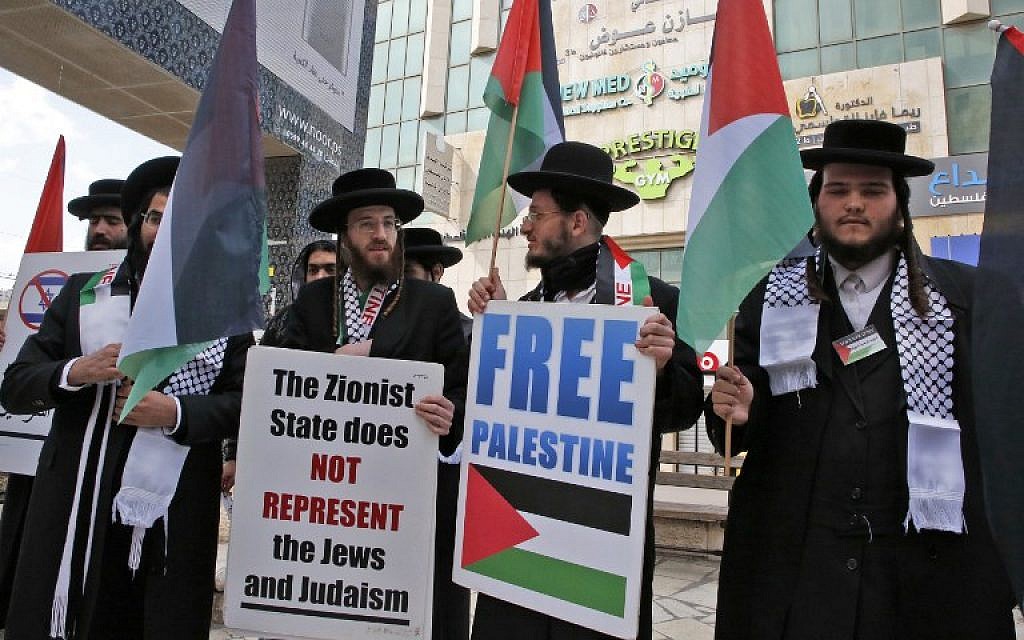
AA: That’s smart.
RT: I just don’t go in there because it’s not a place of productiveness.
AA: True, true. Before we close, Randa, I want to make sure we talk about antisemitism. Any listeners who’ve ever listened to me talk about this know that since I studied in Jerusalem as a college student I’ve been very clear in my separation of the actions of the Israeli state as different from the Israeli people. Because I have very dear Israeli friends, who in turn are separate from Jewish people everywhere, that they’re different entities. And getting them conflated can be really dangerous for Jewish people. And I have no problem condemning the immoral actions of any government, including my own government. So, how do you see this issue? And making sure that we’re very clear in condemning any hatred of a group of people.
RT: Yeah, thank you for that. Zionism and Judaism are different, they have different roots. Judaism is an ancient religion full of ritual practices and cultural beliefs. Zionism is a nationalist movement that started in Europe in the late 19th century. The founders of Zionism were secular. And so I think that what we have to understand is actually that these are two different things. When I think of Jewish political activity, I am more associated with Jewish leftists in New York and the history of anti-capitalism and migrant justice. And that’s also part of a political Jewish movement. So we have to understand that these things are much more complex than simply a religion. If people are critical of evangelical right-wing US politics, you don’t ask them, “Are you against Christianity?” Because we see it as a difference. So I see this really as that very distinct difference.
And actually, I would argue that the history of antisemitism and the history of Islamophobia, anti-Islam, are deeply connected. Both are rooted in Europe and rooted in this unease of the Arabs on the outside of the gates of Europe and the Jews on the inside of Europe. That both pose some sort of threat towards European nationalism, towards Europe’s cohesiveness, towards their superiority. So we see these two things as really connected “others” of Europe. And the fact that a Jewish national home was put in the Middle East in a place that’s mostly Islamic, is almost like exporting a problem. I honestly think it’s the most amazing PR campaign that Europe literally murdered 6 million Jews and then say that Arabs are the ones who hate Jews. That Arabs are antisemitic. Dude, ask your grandparents what they were doing in 1945. Mine were not involved in that. They were chilling in Jerusalem. So there is something really distorted about both conflating anti-Zionism and antisemitism and then always asking Arabs to be on the defensive, because the people who should be on the defensive are the Europeans and the Americans who not only murdered Jewish people, but also didn’t allow them into their countries when they were running away from being murdered. Those are the people who have things to answer for.
AA: Well, that should just be a mic drop, Randa, and we’re going to end there. I’m so, so grateful for this conversation.
RT: Oh, me too.
AA: It’s been really, really helpful for me and my own understanding. I learned so much from you.
RT: Thank you so much for having me and letting me speak candidly. It’s really wonderful. Thank you.
the history of antisemitism and the history of Islamophobia
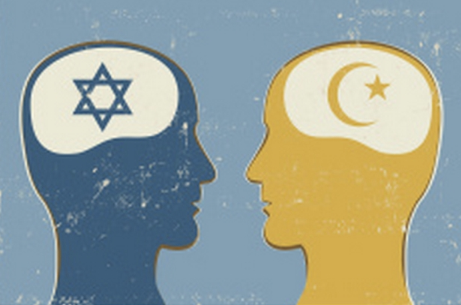
are deeply connected
Listen to the Episode
&
Share your Comments with us below!

